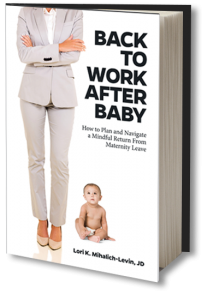 The so-called “mental load” of caring for other human beings is real. Today on the Mindful Return blog, Dr. Emma Basch is back with 7 practical ways to lighten that burden of new working parenthood.
The so-called “mental load” of caring for other human beings is real. Today on the Mindful Return blog, Dr. Emma Basch is back with 7 practical ways to lighten that burden of new working parenthood.
*********************************************
A few weeks ago on my blog, I spoke about the dip in marital satisfaction that 67% of married couples report after having a baby. There are many reasons why this happens. But in my opinion, the most common culprit is emotional labor.
Emotional labor refers to the invisible (and unpaid) work of caring for your feelings, as well as managing the feelings of others. It is the mental load of managing households. Being the one to remember important dates and appointments. Remembering birthdays. Ordering food before the fridge is empty. It is work that falls disproportionately on women’s shoulders.
Even in the most egalitarian of relationships, emotional labor intensifies after having a baby. For some, this shift in the relationship starts, because the non-birthing partner feels disempowered or less confident in their ability to caretake. This partner then takes a bit of a back seat in their parenting. Emotional labor and the disparities it creates in relationships gets amplified by problematic parental leave policies (lack of paternity/partner leave, use of primary caregiver model), which reinforce a gendered framework around caretaking. The problem escalates through subtle messages about parental roles from families, neighborhoods, schools, and/or the child’s caretaker. And of course, the birth of a child brings with it vastly more domestic and caretaking responsibilities. Emotional labor piles on.
So how do you solve a problem like emotional labor?
The answer to this is complicated, because often the person trying to solve the problem is the person bogged down by emotional labor. Thus, taking on emotional labor involves MORE emotional labor. So, what are we to do? While I don’t have a grand solution, I can offer some suggestions to lighten the load and shift the framework.
- Clarify Expectations with Your Partner: Ideally before your baby arrives, or before one or both partners go back to work, together lay out who is responsible for what domestic/caretaking tasks, and decide together on what tasks to prioritize. Research suggests that, especially for moms, marital happiness is linked to feeling satisfied with the division of labor at home.
- Communication with Caregivers: It may seem straightforward, but set up communication with whoever takes care of your child to include both parents. For example, set up a group text or email with your child’s caregivers. Similarly, if you are fielding all child and domestic related questions/concerns from family, start cc’ing your partner in all email responses and include them in the process. Together with your partner, establish expectations about who is responsible for responding to communication and in what timeline
- Work Collaboratively: Many of my patients describe feeling as though they are always delegating assignments to their partners. This is a recipe for resentment and of course contributes to emotional labor. To mitigate this, I love Lori’s suggestions of a weekly meeting to iron out tasks, chores, and childcare, and to set clear expectations about who is responsible for what. I also recommend that couples share to-do lists, sync calendars, and have a clear system in place to communicate to one another when a task is completed. This way, no one feels like they have to micromanage.
- Let Go: Many of my clients describe moments of feeling stuck or rigid when thinking about how a task should be executed, or in more minor parenting decisions. Getting stuck is very much a result of emotional labor, which leads them to feel overly responsible and inflates the importance of some tasks. For example, for one client it was the cat litter. She wanted her husband to clean the litter box in the morning. And while he was diligent about completing the task, he preferred to do it at the end of day. This led to significant conflict, until she was able to recognize why she was anxious about how the task was executed (she was worried he would forget) and realized she could let this one go.
- Maternal Gatekeeping: This term refers to the ways in which a mom (in hetero cis households) engages in behaviors that either encourage or interfere with her spouse’s domestic responsibilities or access to kids. It is often the result of internalized messages around gender and motherhood. These messages make women feel as though they should be responsible for caretaking and/or that they are more competent at it. Opening those gates means letting go and letting your partner do things differently. If it feels hard to let go (perhaps there is a fear that your partner will let you down) start by picking one task (maybe one you dislike doing) and letting your partner have ownership of it.
- Watch Your Language: As a practitioner of Acceptance and Commitment Therapy (ACT), I am always looking at the ways my clients use language. Specifically, in ACT, we look at how language ensnares clients in emotional suffering. When it comes to mitigating emotional labor, the way we talk matters. For example, I love this article by Dana McMahan, which speaks to how impactful it was for her family to abolish the word “help.” Specifically, she realized that asking her husband to “help” with a task sent the message that the task was hers, rather than a shared responsibility.
- Education: I have found that many people (often male partners) are unfamiliar with the concept of emotional labor. Simply learning about what it means and where it stems from can be really helpful in a relationship. Read an article about it with your partner. Talk together about how it feels to carry the load. Just being understood and seen by your partner in this way can feel so positively impactful.
Emotional labor absolutely intensifies after having a baby. And trying to tackle such a deeply embedded social problem with too little sleep and not enough time in the day can feel insurmountable. However, finding little ways to challenge social and relationship norms can go a long way toward lightening the load, and improving the quality of your relationship.
 Emma Basch is a licensed clinical psychologist with a specialty in women’s mental health, reproductive psychology, and the perinatal period. She maintains a private practice in Washington, DC, where she works with individuals and groups around issues concerning perinatal mood and anxiety disorders, fertility, pregnancy loss, and adjustment to parenthood. Emma also writes frequently on topics concerning reproductive health, offers trainings on the subject to allied professionals, and offers workshops around DC for pregnant and postpartum women. She has received training from the Postpartum Stress Center and Postpartum Support International.
Emma Basch is a licensed clinical psychologist with a specialty in women’s mental health, reproductive psychology, and the perinatal period. She maintains a private practice in Washington, DC, where she works with individuals and groups around issues concerning perinatal mood and anxiety disorders, fertility, pregnancy loss, and adjustment to parenthood. Emma also writes frequently on topics concerning reproductive health, offers trainings on the subject to allied professionals, and offers workshops around DC for pregnant and postpartum women. She has received training from the Postpartum Stress Center and Postpartum Support International.
 If you need more help getting your head in a better place to return to work after maternity leave, join us for the next session of Mindful Return.
If you need more help getting your head in a better place to return to work after maternity leave, join us for the next session of Mindful Return.
Want more practical tips on working parenthood? Check out my book, Back to Work After Baby: How to Plan and Navigate a Mindful Return from Maternity Leave.


